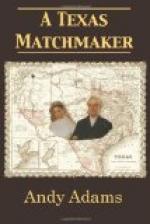This was my first experience with a serious drouth. Uncle Lance, however, met the emergency as though it were part of the day’s work, riding continually with the rest of us. During the latter part of March, Aaron Scales, two vaqueros, and myself came in one night from the Ganso and announced not over a month’s supply of water in that creek. We also reported to our employer that during our two days’ ride, we had skinned some ten cattle, four of which were in our own brand.
“That’s not as bad as it might be,” said the old ranchero, philosophically. “You see, boys, I’ve been through three drouths since I began ranching on this river. The second one, in ’51, was the worst; cattle skulls were as thick along the Nueces that year as sunflowers in August. In ’66 it was nearly as bad, there being more cattle; but it didn’t hurt me very much, as mavericking had been good for some time before and for several years following, and I soon recovered my losses. The first one lasted three years, and had there been as many cattle as there are now, half of them would have died. The spring before the second drouth, I acted as padrino for Tiburcio and his wife, who was at that time a mere slip of a girl living at the Mission. Before they had time to get married, the dry spell set in and they put the wedding off until it should rain. I ridiculed the idea, but they were both superstitious and stuck it out. And honest, boys, there wasn’t enough rain fell in two years to wet your shirt. In my forty years on the Nueces, I’ve seen hard times, but that drouth was the toughest of them all. Game and birds left the country, and the cattle were too poor to eat. Whenever our provisions ran low, I sent Tiburcio to the coast with a load of hides, using six yoke of oxen to handle a cargo of about a ton. The oxen were so poor that they had to stand twice in one place to make a shadow, and we wouldn’t take gold for our flint hides but insisted on the staples of life. At one point on the road, Tiburcio had to give a quart of flour for watering his team both going and coming. They say that when the Jews quit a country, it’s time for the gentiles to leave. But we old timers are just like a horse that chooses a new range and will stay with it until he starves or dies with old age.”




